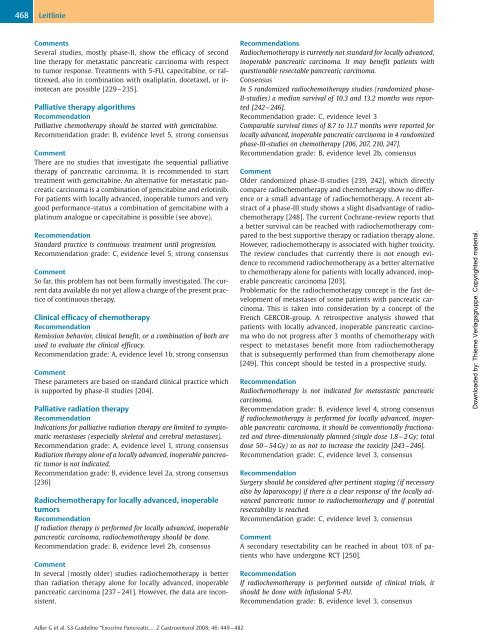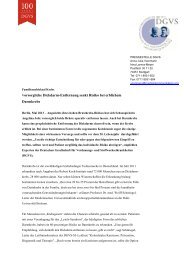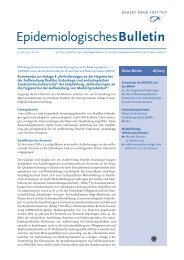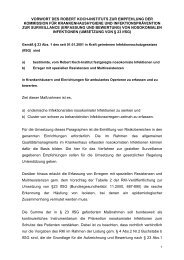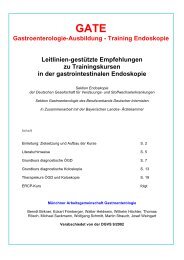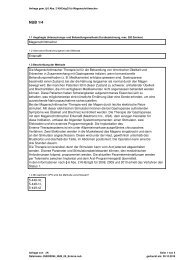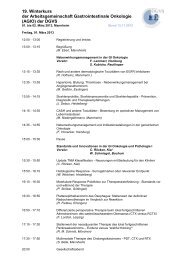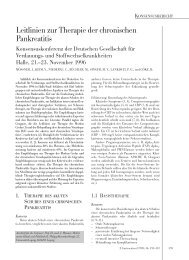S3-Guideline “Exocrine Pancreatic Carcinoma” 20071 ... - DGVS
S3-Guideline “Exocrine Pancreatic Carcinoma” 20071 ... - DGVS
S3-Guideline “Exocrine Pancreatic Carcinoma” 20071 ... - DGVS
You also want an ePaper? Increase the reach of your titles
YUMPU automatically turns print PDFs into web optimized ePapers that Google loves.
468<br />
Leitlinie<br />
Comments<br />
Several studies, mostly phase-II, show the efficacy of second<br />
line therapy for metastatic pancreatic carcinoma with respect<br />
to tumor response. Treatments with 5-FU, capecitabine, or raltitrexed,<br />
also in combination with oxaliplatin, docetaxel, or irinotecan<br />
are possible [229 – 235].<br />
Palliative therapy algorithms<br />
Recommendation<br />
Palliative chemotherapy should be started with gemcitabine.<br />
Recommendation grade: B, evidence level 5, strong consensus<br />
Comment<br />
There are no studies that investigate the sequential palliative<br />
therapy of pancreatic carcinoma. It is recommended to start<br />
treatment with gemcitabine. An alternative for metastatic pancreatic<br />
carcinoma is a combination of gemcitabine and erlotinib.<br />
For patients with locally advanced, inoperable tumors and very<br />
good performance-status a combination of gemcitabine with a<br />
platinum analogue or capecitabine is possible (see above).<br />
Recommendation<br />
Standard practice is continuous treatment until progression.<br />
Recommendation grade: C, evidence level 5, strong consensus<br />
Comment<br />
So far, this problem has not been formally investigated. The current<br />
data available do not yet allow a change of the present practice<br />
of continuous therapy.<br />
Clinical efficacy of chemotherapy<br />
Recommendation<br />
Remission behavior, clinical benefit, or a combination of both are<br />
used to evaluate the clinical efficacy.<br />
Recommendation grade: A, evidence level 1b, strong consensus<br />
Comment<br />
These parameters are based on standard clinical practice which<br />
is supported by phase-II studies [204].<br />
Palliative radiation therapy<br />
Recommendation<br />
Indications for palliative radiation therapy are limited to symptomatic<br />
metastases (especially skeletal and cerebral metastases).<br />
Recommendation grade: A, evidence level 1, strong consensus<br />
Radiation therapy alone of a locally advanced, inoperable pancreatic<br />
tumor is not indicated.<br />
Recommendation grade: B, evidence level 2a, strong consensus<br />
[236]<br />
Radiochemotherapy for locally advanced, inoperable<br />
tumors<br />
Recommendation<br />
If radiation therapy is performed for locally advanced, inoperable<br />
pancreatic carcinoma, radiochemotherapy should be done.<br />
Recommendation grade: B, evidence level 2b, consensus<br />
Comment<br />
In several (mostly older) studies radiochemotherapy is better<br />
than radiation therapy alone for locally advanced, inoperable<br />
pancreatic carcinoma [237 –241]. However, the data are inconsistent.<br />
Adler G et al. <strong>S3</strong>-<strong>Guideline</strong> <strong>“Exocrine</strong> <strong>Pancreatic</strong>… Z Gastroenterol 2008; 46: 449–482<br />
Recommendations<br />
Radiochemotherapy is currently not standard for locally advanced,<br />
inoperable pancreatic carcinoma. It may benefit patients with<br />
questionable resectable pancreatic carcinoma.<br />
Consensus<br />
In 5 randomized radiochemotherapy studies (randomized phase-<br />
II-studies) a median survival of 10.3 and 13.2 months was reported<br />
[242–246].<br />
Recommendation grade: C, evidence level 3<br />
Comparable survival times of 8.7 to 11.7 months were reported for<br />
locally advanced, inoperable pancreatic carcinoma in 4 randomized<br />
phase-III-studies on chemotherapy [206, 207, 210, 247].<br />
Recommendation grade: B, evidence level 2b, consensus<br />
Comment<br />
Older randomized phase-II-studies [239, 242], which directly<br />
compare radiochemotherapy and chemotherapy show no difference<br />
or a small advantage of radiochemotherapy. A recent abstract<br />
of a phase-III study shows a slight disadvantage of radiochemotherapy<br />
[248]. The current Cochrane-review reports that<br />
a better survival can be reached with radiochemotherapy compared<br />
to the best supportive therapy or radiation therapy alone.<br />
However, radiochemotherapy is associated with higher toxicity.<br />
The review concludes that currently there is not enough evidence<br />
to recommend radiochemotherapy as a better alternative<br />
to chemotherapy alone for patients with locally advanced, inoperable<br />
pancreatic carcinoma [203].<br />
Problematic for the radiochemotherapy concept is the fast development<br />
of metastases of some patients with pancreatic carcinoma.<br />
This is taken into consideration by a concept of the<br />
French GERCOR-group. A retrospective analysis showed that<br />
patients with locally advanced, inoperable pancreatic carcinoma<br />
who do not progress after 3 months of chemotherapy with<br />
respect to metastases benefit more from radiochemotherapy<br />
that is subsequently performed than from chemotherapy alone<br />
[249]. This concept should be tested in a prospective study.<br />
Recommendation<br />
Radiochemotherapy is not indicated for metastastic pancreatic<br />
carcinoma.<br />
Recommendation grade: B, evidence level 4, strong consensus<br />
If radiochemotherapy is performed for locally advanced, inoperable<br />
pancreatic carcinoma, it should be conventionally fractionated<br />
and three-dimensionally planned (single dose 1.8 – 2 Gy; total<br />
dose 50 – 54 Gy) so as not to increase the toxicity [243–246].<br />
Recommendation grade: C, evidence level 3, consensus<br />
Recommendation<br />
Surgery should be considered after pertinent staging (if necessary<br />
also by laparoscopy) if there is a clear response of the locally advanced<br />
pancreatic tumor to radiochemotherapy and if potential<br />
resectability is reached.<br />
Recommendation grade: C, evidence level 3, consensus<br />
Comment<br />
A secondary resectability can be reached in about 10% of patients<br />
who have undergone RCT [250].<br />
Recommendation<br />
If radiochemotherapy is performed outside of clinical trials, it<br />
should be done with infusional 5-FU.<br />
Recommendation grade: B, evidence level 3, consensus<br />
Downloaded by: Thieme Verlagsgruppe. Copyrighted material.


